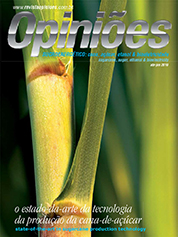Edelclaiton Daros
Director of Ridesa
Op-AA-24
Ridesa sugarcane breeding program
Ridesa, the Inter-university Network for the Development of the Sugar and Ethanol Industry, has existed for twenty years and when taking into consideration the existence, since 1970, of Planalsucar (the Nacional sugarcane breeding program), has conducted research in breeding for the last forty years. The network currently consists of ten federal universities and others soon to be added.
Clones and RB varieties are tested in states from Rio Grande do Sul to Maranhão, in 72 advanced generation selection bases, in which adaptability and stability are assessed in the context of different production environments. Currently, apart from the Blooming and Cross-breeding Center of Serra do Ouro, a part of the Federal University of Alagoas, with in excess of 2,600 genotypes in its germ plasma sample bank, the Blooming and Crossbreeding Center of Devaneio, a part of the Federal Rural University of Pernambuco, was incorporated to the network. It has more than 600 elite genotypes in its germ plasma sample bank.
Due to the universities’ peculiarities, each has its own selection logistics program, which has greatly enhanced the institutions’ creativity programs, which, following testing, are implemented in other universities, resulting in significant gains in selection and evaluation processes. The initial selection in phase T1 takes place in twenty five locations in Brazil, with two million seedling units made available in the field annually, in bi-parental, policross and cross-area breeding.
In the advanced phases, the best clones of the experimental stage are sent to other universities. Every year, this results in the exchange of more than 70 elite clones, to be tested in those regions, in appropriate logistics, exemplified by the introduction and planting in the mid-South of the clone that became variety RB92579, entailing high growth potential.
In these 40 years, 78 varieties were approved and put to use in 60% of the areas planted with sugarcane in Brazil. In some states, this figure exceeded 80% in RB varieties. In the days of Planalsucar, 19 varieties were approved, particularly the variety RB72454, which occupied the largest planted area with a single variety in Brazil and hence, in the world.
Nowadays, 24 years later, it still occupies a considerable plantation area. However, with the appearance of the orange rust disease, and given its susceptibility, one believes it will be replaced over time. Ridesa approved 59 varieties, notably variety RB867515, currently the most planted in the country, replacing RB72454. This variety overcame challenges and consolidated agro-industrial productivity in unfavorable environments.
The RB855156 variety, which changed the harvesting profile, anticipated the start of the harvest to April, it is precocious, abundant and productive, providing the industry conditions to better plan harvests. More recently, the variety RB92579 caused impact in the Northeastern region, with agro-industrial productivity ratings reaching 30 to 40% above those of the currently planted varieties. Its field behavior in the mid-South region is indicative of a promising future.
Breeding programs are faced with many problems. We are already projecting varieties with a profile for 2050, encompassing the industry’s view of the needs for the future. Predicting the introduction of mechanical planting and harvesting, our selections changed to valorize easily harvestable clones with morphological characteristics for mechanical planting that, in a short period, will be approved.
The appearance of the orange rust disease was no reason for concern, given that our varieties and clones were already being tested outside the country. Preliminary data on these clones resistant to the disease is already being used in selecting the cross- breeding required to obtain new varieties. We are alert and we are assessing the potential of new diseases ap-pearing, by celebrating cooperation agreements with universities and international research institutes.
Our objectives are to incorporate new universities to expand activities, consolidate existing programs and go forward in the search for new varieties, mainly in the cerrado and the country’s Northeast regions. In parallel to this clone selection process, the promising varieties are being genetically modified to resist hydric stress, pests and diseases, and to fix nitrogen.
The sugarcane breeding program, involving the selection of morphological, performance and agronomic haracteristics, is being carried out with the intent to select clones for small producers, to mainly facilitate harvesting for the production of brown sugar and cachaça (sugarcane rum). Another demand relates to sugarcane for fodder that some universities in the network are working on, and for which certain desirable characteristics have already been selected.
We are also offering, in many of the universities, graduate, master and doctoral courses in the field of sugarcane, encompassing from management to breeding, seeking to consolidate knowledge of the crop, as well as to attract researchers for future programs to be of-fered in Brazil. We emphasize that this private public partnership of the industry with universities, in which more than 90% have signed an agreement with Ridesa, is the basis of our success.




